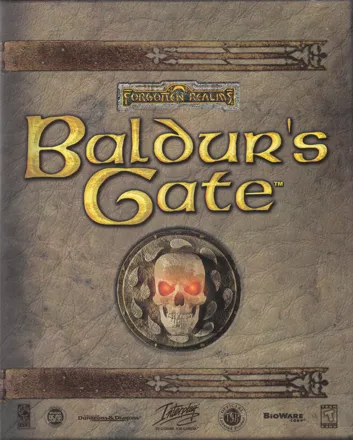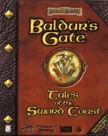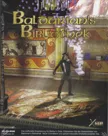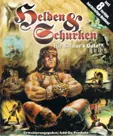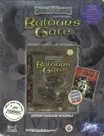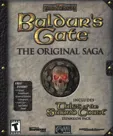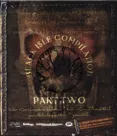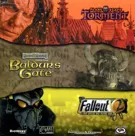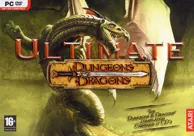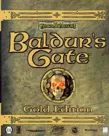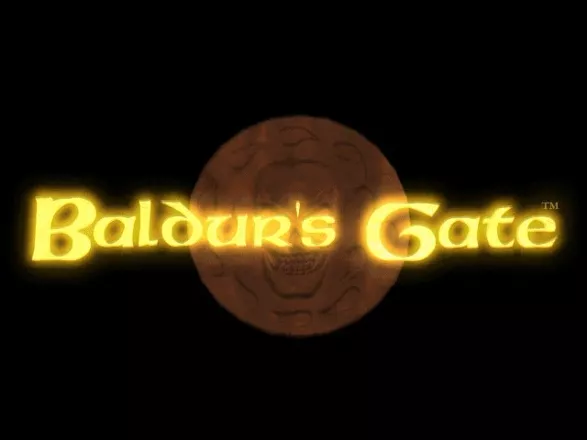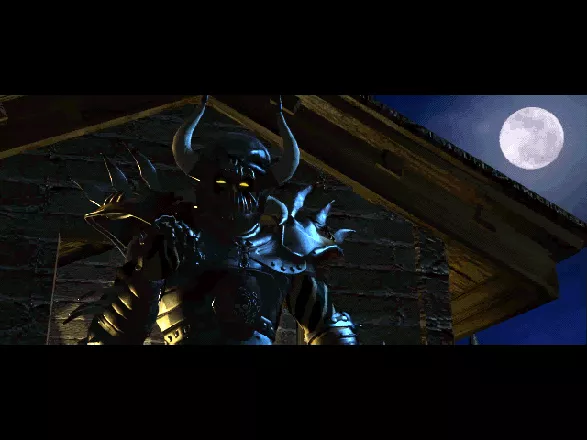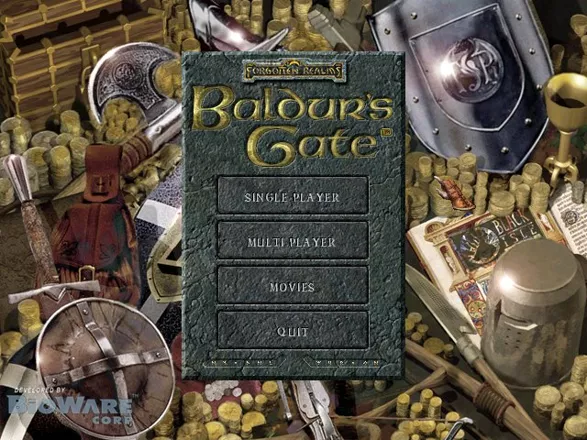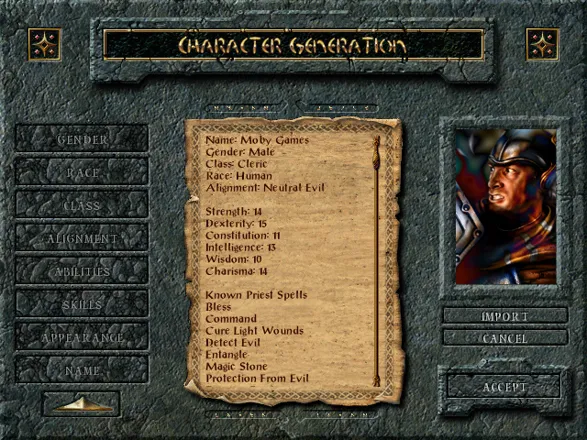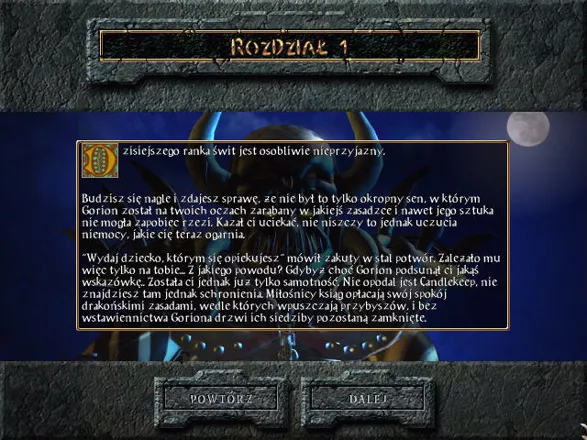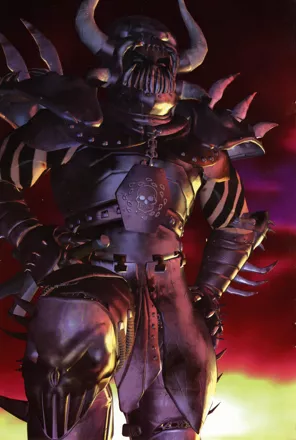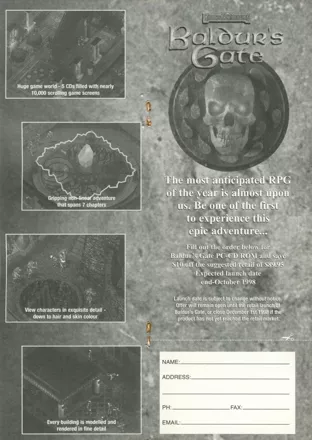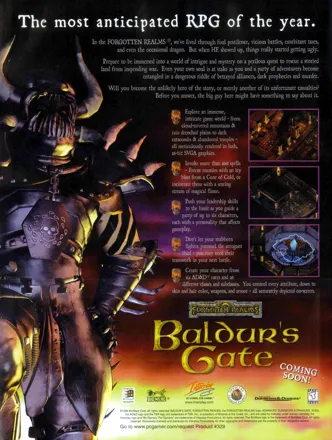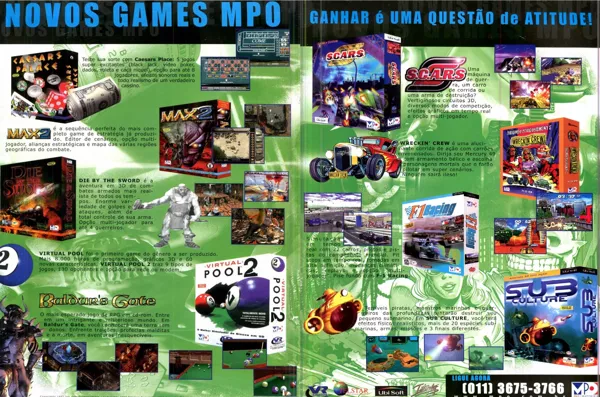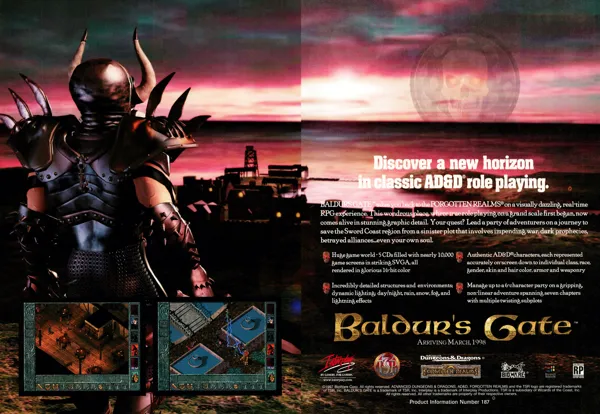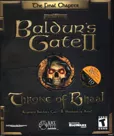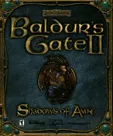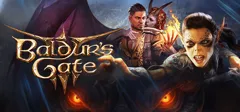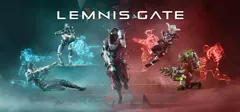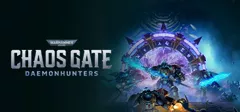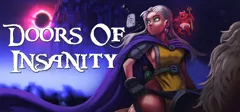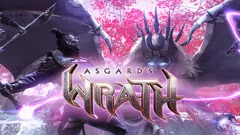Baldur's Gate
-
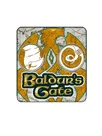 Baldur's Gate
(2005 on
J2ME)
Baldur's Gate
(2005 on
J2ME)
Description official descriptions
Candlekeep is an ancient fortress situated on the rural Sword Coast. Recently, inexplicable events have been plaguing this quiet place, which has long become a large library where men of wisdom and knowledge can study in peace. Unknown mercenaries try to enter the walls of Candlekeep, interested in a seemingly ordinary and unimportant young person - an orphan who was taken in by the mage Gorion and treated by him as his own child. One night, Gorion decides to leave Candlekeep and take his adopted child to a safe place. However, as they leave the fortress, they are ambushed by a group of assassins. The orphan manages to escape, but Gorion dies in battle.
The gates of Candlekeep are locked, because its inhabitants are afraid to attract to themselves the wrath of the mysterious attackers. Only Imoen, another child who was brought up by Gorion and has been like a sister to the protagonist, is willing to share the uncertain future. The two have nothing, no place to call their home, only a wide hostile world in front of them. A long and perilous journey begins there.
Baldur's Gate is a role-playing game that uses the rule set of Advanced Dungeons & Dragons (AD&D). Set in the universe of Forgotten Realms, the game is the first part of the saga that lets the player explore various towns, wilderness areas and dungeons, undertake many side quests, and find companions for the long journey. The player creates the hero(ine) by selecting his or her class, choosing between fighter, thief, mage, priest, ranger, and druid (including sub-classes, dual- and multi-class characters); alignment (Good-Evil and Lawful-Chaotic axis), and weapon proficiencies. The 2nd edition AD&D rules are applied in the game during combat, character leveling, class restrictions, etc.
Up to six player-controlled characters can participate in combat. Battles occur in the same environment as exploration, and flow in real time, though the player is able to pause combat at any time to issue precise commands to any of the characters. Once the game is unpaused, the characters repeat the last action selected by the player until it is changed or becomes impossible to execute. Characters can freely move during battles; party formation and positioning in combat play a significant role.
Spellings
- Ворота Бальдура - Russian spelling
- バルダーズ・ゲート - Japanese spelling
- 博德之门 - Simplified Chinese spelling
- 柏德之門 - Traditional Chinese spelling
Groups +
- Baldur's Gate series
- Dungeons & Dragons (D&D / AD&D) licensees
- Dungeons & Dragons Campaign Setting: Forgotten Realms
- Fantasy creatures: Dwarves
- Fantasy creatures: Elves
- Fantasy creatures: Gnomes
- Fantasy creatures: Halflings / Hobbits
- Game Engine: Infinity Engine
- Gameplay feature: Auto-mapping
- Gameplay feature: Character development - Skill distribution
- Gameplay feature: Dating / Romance
- Gameplay feature: Journal
- Gameplay feature: Karma meter
- Gameplay feature: Paper doll inventory
- Gameplay feature: Pickpocketing
- Games made into books
- Games made into comics
- Physical Bonus Content: World Map
- Protagonist: Female (option)
- Replay (GT / Infogrames / Atari) releases
- Scripting language: Lua
- White Label releases
Screenshots
Promos
Videos
Add Trailer or Gameplay Video +1 point
See any errors or missing info for this game?
You can submit a correction, contribute trivia, add to a game group, add a related site or alternate title.
Credits (Windows version)
375 People (324 developers, 51 thanks) · View all
| Lead Design | |
| Design | |
| Lead Programming | |
| Programming | |
| Additional Programming | |
| Graphics / 3D Programming | |
| Music / Sound Programming | |
| AI Programming | |
| Libraries / Utilities | |
| Producer | |
| [ full credits ] | |
Reviews
Critics
Average score: 90% (based on 56 ratings)
Players
Average score: 4.1 out of 5 (based on 296 ratings with 17 reviews)
Yes, my omnipresent authority figure!
The Good
Three games heralded the RPG Renaissance during the second half of the 1990's, popularizing the genre more than ever before: Diablo, Fallout, and Baldur's Gate. Of those three, the last one went on to become the longest-lasting, most influential template for modern RPG design.
Baldur's Gate is BioWare's first RPG and their second game in general. It is quite remarkable that the Canadian developers could produce an instant classic despite apparent lack of experience. According to their own statement, they were highly reverent of Ultima series and SSI's work, and that sentiment is manifested in the game's emphasis on exploration and writing on one side, and its adherence to classic AD&D mechanics on the other.
A strong influence must have been Dark Sun games, which attempted to modernize traditional RPGs a few years before. But Baldur's Gate is bolder than Dark Sun, and feels more exciting thanks to the cues it takes from Ultima games. It has more personality, more life in its locations, more spirit present in gameplay devices it uses to the advantages of narrative and immersion.
Right after the dramatic prologue, the world of Baldur's Gate becomes available for exploration. Theoretically, you can just march to the titular city the moment you are thrown out of Candlekeep, trying to run away from battles you wouldn't survive. Many locations are optional and exploration is essential for finding the next objective and advancing the plot. In this way, Baldur's Gate is an old-school game: it doesn't hold your hand, and it challenges you. At the same time, its scripted events make you feel closer to the main story: assassins would jump out of nowhere and go after you, you'll meet characters who may contribute valuable information, and so on. The game is less open-ended or flexible in its role-playing than Fallout, but there is still a considerable degree of freedom. Who doesn't know the joy of spending the first twenty minutes of a game mowing down innocent cows or sending your thief on a crime spree in the local hotel?
The game's engine is an absolute beauty. It allows free movement through isometric environments, with each party member being fully controllable. Exploration and combat are continuous, greatly contributing to immersion and suspense, making battles dynamic and exciting, and opening up interesting possibilities. You can, for example, have your thief hide in shadows and send him to explore a dungeon area full of dangerous monsters, disable all the traps, perhaps even backstab and kill a couple of weaker enemies, and then safely come back.
Combat flows in real time, but you can pause it to issue specific orders to your characters, like in Darklands. This option makes both quick skirmishes as well as deeply planned tactical battles possible. You'll have to manage your melee fighters, spellcasters and ranged attackers correctly in order to gain the upper hand. Smart positioning may lead you to victory that would be absolutely impossible if you just put all party members together and charged at the enemies. The system also allows for neat tricks such as sending one character far ahead, spotting enemies, and luring them to come to you one-by-one - but don't hope that every type of enemy will fall for that.
Enemy AI in the game is quite impressive. Foes will often come in large groups complete with melee fighters, archers, and mages, who will also use tactical planning to assault you. The most exciting and difficult battles in Baldur's Gate are thus party-to-party confrontations. Overall, the game boasts some of the most flexible, enjoyable, and reasonably deep combat around - challenging yet not frustrating, fairly complex without the head-spinning detail of Realms of Arkania.
In terms of storytelling and approach to characterization, Baldur's Gate is closer to Ultima than to SSI's games. The main attraction of the story is the presence of a hero with a real biography - he (or she) is not some kind of a wandering knight or adventurer without a real purpose in life, but a young scared boy (or girl) thrown out of home, threatened by mysterious assassins, having no place in the hostile world. You start the adventure with virtually nothing, being weak and helpless, without a clear idea about what is going on and why those people killed your foster father and want to kill you, but gradually develop into a mighty, fearsome warrior (well, that comes later, in Throne of Bhaal). Your purpose is not to save villages and the world, but yourself, in what can be qualified as a "medieval espionage thriller".
But of course, you are not alone in this dangerous world: there are people who will help you in your perilous journey. The more you explore the game world, the more characters you'll meet who are willing to join your party for various reasons. The choice is vast - chances are you'll be switching your party members and experimenting with them until the end of the game. Every character has their own advantages or disadvantages, but it is possible (and necessary) to create a versatile and well-balanced party to confront all dangers. Those characters often have interesting or amusing personalities, making the script livelier and infusing it with good writing and humorous elements. Who can ever forget the hyperactive ranger Minsc with his "miniaturized space hamster" Boo?..
Lastly, the game has lovely isometric graphics with plenty of warmth and detail, and a beautiful orchestral soundtrack consisting mainly of appropriately modal, archaic-sounding tunes. Many locations ooze cozy atmosphere, and even the many "empty" wilderness screens are a pleasure to explore.
The Bad
Some people just don't like AD&D. I understanding that figuring out stuff like THAC0 or the amount of dice the game throws to calculate damage can get in the way of those who just want to dive into action. That is hardly the fault of developers who decide to base their game on a certain set of pre-existing rules and therefore have to follow it. Personally, I think the game could have been a little bit less vanilla D&D. Dark Sun games had unique races and a more exotic scenario. Here, you'll just have to settle for humanoid characters in a strict medieval atmosphere.
Others don't appreciate the difficulty of combat. I really like it the way it was, but perhaps the characters could have been made slightly more powerful. Mages at early development stages are next to useless, and the game is over before you get to the really nifty spells. That's one of the reasons Baldur's Gate is best enjoyed in conjunction with its excellent sequels.
The Bottom Line
One of BioWare's commercials I read stated that this company had revived the RPG genre. As blatant as it sounds, there is truth in that statement. The designers took essential components of classic medieval RPGs and molded them into a game that feels old and new at once, traditional in spirit and modern in execution. Baldur's Gate is a masterfully designed landmark game that respectfully bows to the past and at the same time confidently gazes into the future.
Windows · by Unicorn Lynx (181780) · 2014
The Good
Oh how much I wish I could love this game. Before the game was released I eagerly waited it hoping the world would see another oldschool RPG but alas, the result was big load of crap. At the first glimpse the game looks nice, it feels like any epic big RPG, you got a massive world you can walk in, you got many characters and such... the feeling is there. And the music is somewhat nice, although it's way too little of it. I guess that's all the good I can say.
The Bad
First of all... the D&D system. I hate it. When making characters, a player essentially presses reroll a thousand times to gain super stats. The element of race is very weak, and it just seems that Elves has more intelligence and stuff like that, which makes it far too specific. Any mage will automatically select an Elf because he's better with that kind of stuff, that's it, the selection of class controls which race you are. To me, it gives me the feeling that the race element isn't there, the advantages should either be removed (so that real roleplayers can select whatever race he likes to roleplay without thinking about disadvantages) or be non-specific (so that the race only slightly bends in that general direction the player wants to play). You never get the feeling you're growing since you gain levels so darn sloooooow, and there's almost no choices when rising in levels and the stats element is so weak, it just isn't fun. The D&D rules are obviously made for board playing where you have a single game you play for months and months, and this isn't the case with most games (unless you like playing games like Diablo with the same character over and over again in years.). The makers should play games like System Shock 2, Ultima Online, Ultima Underworld, which I personally think are very good examples of games with excellent RPG systems. Another bad thing about the D&D system... dices... most random elements is based on the single throw of a dice. This is a waste, computers are capable of doing extreme mathematical jobs, and combat is based on the throw of a dice??? For instance a game like Jagged Alliance 2 uses very advanced algorithms for calculating the trajectory of a bullet, as the end result the random element is very balanced. This is not the case in Baldur's Gate, you select an enemy and pray to god you hit. Okay, I'll stop with my bashing of the D&D system and actually go onto the game itself, the readers who like D&D system should just ignore this paragraph anyway.
The combat system is insanely simple, you can pause the action with spacebar, and you give limited orders to your characters. Basically almost in every fight you'll just want to click on your characters and click on the enemies and hope you win. There's little element of tactic or challenge... I hate the combat system. One thing which intrigued me at first in the game was the thief element, you go into houses at night and steal stuff... sadly, that element is weak, you essentially picklock the lock, go into and look into each drawer for anything worthwhile. There's no element of sneaking, or anything thief-like. I'm not sure how the element should be like, but anything else besides this anyway would do I guess. Anyway, after one breakin you're doomed to be bored with that.
The game takes 5 cds, and you feel like you're playing a game which is 15 years old when you needed to change diskette all the time... why? Why the heck did they do this? I'm not sure why it takes so many cds, there's not many cutscenes, there's not much spoken dialogue... the only logical solution is that every 2d background is stored like one gigantic bmp-alike file. Which would be simply stupid, since the backgrounds are simple and dull, and in that case why didn't they just go for a tilebased system? This is just a complete waste of space. And for those who don't have big enough harddrive to copy all the cds, be prepared to do a good deal of cd swapping.
The storyline is one big cliche and boring, there's little replayablity value since nothing is different the second time around, the sounds are nothing to brag about... the game is plainly dull.
The Bottom Line
The last line in my "bad" section sums it up nicely... dull, dull and dull. For those who like the D&D system and who like light RPGs with little to offer will perhaps like this game. Hardcore gamers should burn the game at sight. The funny thing is that the crappy engine has actually been used for one addon, two spinoff games, and even the sequel used the same engine, and they all use a massive amount of cds. A waste of space.
Windows · by Kate Jones (416) · 2001
I really wanted to like this game. I really did. But I don't.
The Good
I remember when this game first came out. After viewing either the trailer or a demo (can't remember which), I knew that it was my destiny to one day play this game. At the time, I was freshly out of college and delightfully unemployed... thus, no way I could shell out the cash for such a game. Fast forward a few years, and I was able to locate the game at the local used bookstore for about $10. Imagine my delight!
This game looks great. The graphics are very well done, and still hold up today (2006). The game is set in a very detailed world, and the environment is very rich. Sound is also nice, though the random comments from your teammates get a bit boring and repetitive after a while.
I was a paper & pencil AD&D player right around the time they released the 2nd edition rules, and I always got excited when "official" AD&D games were to be released, since I felt as though I had a good feel for them. However...
The Bad
... The game (and, in fact, most AD&D games that I've played, going all the way back to the Gold Box series) is very focused on the rules. And, quite frankly, I think that the P&P ruleset is just too cumbersome for a computer RPG. If you have never read a D&D/AD&D rulebook in your life, you will have something of an awkward learning curve. It can take some time to get a feel for how to generate a decent character and how to balance the party... and nobody likes having to keep starting the game over to re-do the character generation.
Another thing that annoys me more than a little is the walking around. The game world is, as I mentioned, fairly large and detailed. However, once you are in a location (town, dungeon, etc...), there doesn't seem to be any sort of quick way to get from one end of the map to the other. You just click where you want your characters to go, and then they walk there. Pretty standard, except they don't really walk fast. So walking around a town ends up being a series of click, wait, click, wait, click, wait... Or, you can move the map around and click directly on the location you want to walk to. Then you have a reeeeeally long wait while your party walks there. I'm honestly not sure which way is less annoying.
My biggest gripe about the game, though, is that it seemed to get way too hard way too fast. In fact, it was because of this that I never got very far into it. The old meet-an-NPC-who-has-been-hired-by-a-mysterious-force-to-kill-you routine gets old, particularly when the NPCs seem to be either much higher in level -- or at least, much more familiar with all the AD&D rules and the combat system in the game. Near the beginning, I often found that while I was struggling to remember how to tell my party members to move around and do different things, I got more or less wiped out in a couple rounds of combat. I do tend to prefer a turn-based or phase-based combat system, so the pseudo-real-time setup in this game was too much for me to manage on top of everything else. (That's not necessarily a fault of the game, it's probably just that my brain doesn't jive with it.)
There is a difficulty setting, which I left right in the middle (I recall the game telling me that making it easier causes the characters to gain less experience points from fights... so it takes longer to level up). It is my opinion that someone who has never played an AD&D game before should be able to read through the rulebook, start playing at the standard difficulty level, and still have a fair chance at not having to save and restore each time combat starts.
The Bottom Line
Overall, I'm disappointed in the game. I know that it got great reviews everywhere so my first instinct was to convince myself that I wasn't giving the game a fair shake, and that I just needed to get used to it. However, the more I played, the more annoyed I got -- until I finally just stopped playing. Maybe one day I'll give it another chance, but for now it's just getting dusty on my shelf.
Windows · by Mirrorshades2k (274) · 2006
Discussion
| Subject | By | Date |
|---|---|---|
| Remake | Patrick Bregger (300053) | Jun 6, 2013 |
Trivia
Cancelled Dreamcast and PlayStation ports
A Playstation 5-disc version was revealed to be in the works by Interplay on October 25, 1999. It was to be ported by UK developer Runecraft but on March 29, 2000 it was put "on hold" and never saw the light of day. Howewer, years later a nearly finished and working prototype was found and "leaked" to the net by an anonymous collector.
A Dreamcast port was also in the works during that time, but was dropped by SEGA for an unspecified reason in 2000.
Drizzt Do'Urden
Though he appears only once in the game, the legendary Drizzt Do'Urden makes a brief but sweet (and rewarding) guest appearance in a certain part of the game. Drizzt is a very famous D&D character that sprung from the Dark Elf Trilogy of forgotten realms-based novels by R.A. Salvatore.
German version
In the German version all blood and splatter animations were removed.
Graveyards
Visit the cemetery in one of the towns, and you'll be able to read many funny inscriptions on the graves. An example: "Here lies an atheist, all dressed up, and no place to go".
Narrator (Spoiler!)
The same person voices Sarevok (the hero's main adversary) and the narrator in the game. This might be a coincidence, but in Icewind Dale, another AD&D game by Black Isle, the ultimate evil and narrator are done by the same person again, and in that game it's a plot point.
Novel
Wizards of the Coast published a novelization of this game in 1999, written by Forgotten Realms series editor Philip Athans.
Remake
A fan-made remake called Baldur's Gate Reloaded was released as mod for Neverwinter Nights 2 in June 2013.
Sales
In 1999, Baldur's Gate has won the Gold-Award from the German VUD (Verband der Unterhaltungssoftware Deutschland - Entertainment Software Association Germany) for selling more then 100,000 (but less then 200,000) units in Germany, Austria and Switzerland.
Awards
- Computer Gaming World
- April 1999 (Issue #177) – Best RPG of the Year
- GameSpy
- 2001 – #36 Top Game of All Time
- GameStar (Germany)
- Issue 12/1999 - #31 in the "100 Most Important PC Games of the Nineties" ranking
- Origin
- 1998 - Best Role-Playing Computer Game
- PC Gamer
- April 2000 - #9 in the "Magazine's Readers All-Time Top 50 Games" poll
- April 2005 - #11 in the "50 Best Games of All Time" list
- PC Player (Germany)
- Issue 01/2000 - Best RPG in 1999
- Power Play
- Issue 02/1999 – Best Isometric RPG in 1998
- Verband der Unterhaltungssoftware Deutschland<
- 1999 - Gold Award
Information also contributed by Alan Chan, Chris Martin, PCGamer77, Pseudo_Intellectual, Scaryfun, Unicorn Lynx and Xoleras
Analytics
Upgrade to MobyPro to view research rankings!
Related Sites +
-
Baldurdash
A site by Kevin Dorner of Bioware containing unofficial bug fixes for both Baldur's Gate and Tales of the Sword Coast that weren't corrected by any of the official patches. -
Baldurs Gate Trilogy
A German Fansite - containing detailed item, spell, monster, and NPC descriptions (with stats), and others -
Mike's Baldur's Gate pages
A great Baldur's Gate resource site. Maps, weapons/armor, potions, spells, walkthroughs and much more. -
Planet Baldur's Gate
Everything about the Baldur's Gate serie, also including other games from the same publisher. -
Pocket Plane Group
Pocket Plane Group publishes a number of detailed mods for Baldur's Gate and other Infinity Engine games. BG1 projects include the BG1Tutu engine converter and the Indira NPC for BG1Tutu.
Identifiers +
Contribute
Are you familiar with this game? Help document and preserve this entry in video game history! If your contribution is approved, you will earn points and be credited as a contributor.
Contributors to this Entry
Game added by faceless.
Macintosh added by Kabushi.
Additional contributors: Zovni, Unicorn Lynx, Jeanne, Rantanplan, a2136*tds354o12ng, JRK, Alaka, FloodSpectre, Xoleras, jean-louis, Jason Compton, Virgil, Ms. Tea, Paulus18950, Patrick Bregger, Dimi Morabito.
Game added January 9, 2000. Last modified March 28, 2024.
